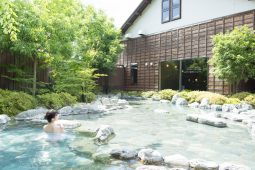Living abroad is exciting, but inevitably adapting to a new culture and language has its own stresses and strains. One of the best ways to maintain your physical and mental wellbeing is to get regular exercise, and of course your diet is important too. In this article we are going to look at some general fitness tips to help you keep happy and healthy while living and working in Japan.
Join a Gym
For many people joining a gym with good quality equipment provides them with the incentive they need to get regular exercise. Private gyms in Japan tend to have good weight training facilities, treadmills, exercise bicycles, swimming pools and fitness classes, and some even have hot tubs and saunas too for relaxing after your work out. You should be aware that joining a private gym in Japan is likely to be a lot more expensive than your home country, costing on average around 11,000 per month. However, in many areas you can find city-run public gym facilities that are much cheaper, costing around 3,000 yen per month for a set number of visits (usually around 10 visits, although sometimes you can simply pay around 500 yen per visit). The quality of the facilities in public gyms can vary a lot by the area, but it is definitely worth giving your local place a try. The most important piece of gym etiquette in Japan is that you need a pair of special indoor gym shoes for use in the gym and you absolutely cannot use the same sneakers you use to jog around the park. Also, because many private gyms require you to sign up for 6 months or longer, then you need to be committed to using it regularly or you will be wasting your money. If you are the sort of person (like me) who signs up for gym membership, visits three times with the best of intentions, and then never goes again, you may be better off investing in some weights and an exercise mat and doing your own work-out at home.
Join a Club
In addition to fitness lessons at your local gym, there are a range of
popular activities that can help you keep fit such as yoga, pilates, belly
dancing, taiko drumming, or martial arts.
Try to find a local class in your area that matches your interests and sign yourself up for a trial lesson. Joining a club is also an excellent way to make friends locally and feel part of a community.
Take a Hike
Japan is an extremely mountainous country and hiking is a very popular activity. Even in the heart of the big city you are always only a short train ride away from fresh country air, forest trails, and spectacular mountaintop views. Popular locations include Mount Takao (which is just an hour’s journey from downtown Tokyo), Mount Yoshino in Nara Prefecture (which is famous for its cherry blossom), Minō Park (a beautiful park with a glorious waterfall in Osaka Prefecture), and of course Mount Fuji (which you have to climb at least once while in Japan). If you don’t fancy hiking on your own, do a quick online search for your area and you are bound to find a local hiking group you can join.
Eat Japanese Food
There is no question that the traditional Japanese diet is one of the healthiest in the world. A typical meal includes healthy low fat proteins such as tofu and fish, plenty of vegetables and mineral-packed edible seaweed, fermented soybean products such as miso soup and natto which are good for your digestion, and green tea which is full of anti-oxidants that boost your immune system and reduce the risk of heart disease. All this and it tastes good too! While in Japan – embrace the Japanese diet!
Visit a Public Bath
Onsen (温泉) hot spring baths, and sentō (銭湯) public bathhouses are ubiquitous throughout Japan and provide excellent facilities in which to relax and unwind. Many public baths have a variety of baths, including some with herbal infusions, and some locations also have jet baths and saunas. A hot bath is not only relaxing, but it improves appetite, eases general fatigue, and is good for your heart, blood circulation, muscles, and joints. The mineral waters of a natural hot spring bath hold additional health properties such as helping to maintain your skin condition, and easing aches and pains.
Meditate
Looking after your mental health is just as important as your physical wellbeing, and meditation is a very good way to maintain your peace of mind. Meditation has been shown to reduce stress and anxiety, help fight addictions, improve sleep, reduce blood pressure, and maintain cardiovascular health. Of course, you can always meditate at home by yourself, but many people find the atmosphere of group meditation at a temple helps them to focus better. There are Zen temples all across the country that offer weekly public meditation sessions, so find one in your area and give it a try.








